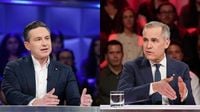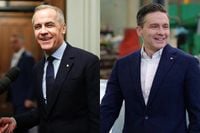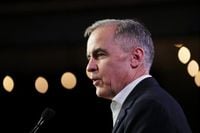In a bid to capture the hearts of Quebec voters, Liberal leader Mark Carney and Conservative leader Pierre Poilievre appeared on the popular talk show Tout le monde en parle on Sunday, April 13, 2025. This show, which regularly attracts up to a million viewers, serves as a significant platform for politicians looking to sway public opinion in the province, especially with the federal election just two weeks away.
Carney, who has been Prime Minister of Canada for just over a month, took the stage first, dressed smartly in a dark suit, and engaged with host Guy A. Lepage. He acknowledged the challenges he faces in connecting with Quebec's electorate, especially given his relatively recent transition from the private sector to politics. "I’m far from perfect. Obviously, my French is far from perfect," Carney admitted, showing a level of humility that some analysts believe could resonate with voters.
During the interview, Carney emphasized his commitment to managing the current crises facing Canada, including the housing crisis. He expressed that his reason for entering politics was to address these pressing issues, stating, "Life is more simple in the private sector, but it’s too important now for our country." This sentiment reflects a broader theme in his campaign, where he seeks to position himself as a pragmatic leader ready to tackle significant challenges.
In contrast, Poilievre, who followed Carney on the show, sought to distance himself from comparisons to U.S. President Donald Trump. He stated, "I have a completely different story from Donald Trump," highlighting his modest upbringing as the child of two middle-class teachers. This attempt to reshape his image comes in light of criticisms that have portrayed him as a 'mini-Trump' due to his aggressive political style.
Poilievre's approach during the interview was notably softer than in previous appearances. He acknowledged his past aggressiveness, attributing it to his desire to fight for the people. "I was the Leader of the Opposition. Now I’m preparing to become Prime Minister. It’s time to present hope," he articulated, signaling a shift in his campaign strategy as he aims to appeal to a broader audience.
Both leaders faced questions regarding their economic policies and their understanding of Quebec culture. Carney was pressed on his economic credentials, and he referenced his experience during the 2008 financial crisis when he was governor of the Bank of Canada. He noted that he had worked closely with former Quebec Premier Jean Charest to navigate that tough period.
When discussing energy policies, Carney indicated his support for making Canada an energy superpower, promising to authorize projects to exploit natural resources, including the possibility of pipelines traversing Quebec. "Quebecers use 355,000 barrels of oil per day, mostly from the United States," he explained, emphasizing the need for social acceptability in any future projects.
Carney also touched on the sensitive topic of Law 21, which bans public sector workers in positions of authority from wearing overt religious symbols. He stressed the importance of balancing individual rights with societal norms, a delicate line in Quebec's political landscape.
Meanwhile, Poilievre reaffirmed his commitment to not cutting funding for Radio-Canada, arguing that its French-language services are vital for promoting francophone culture. He faced questions about his campaign’s limited media access, defending his strategy by pointing out that he engages more with local media.
As the interviews progressed, both leaders showed signs of their efforts to connect with Quebec's unique political environment. Carney, in particular, was tested on his knowledge of Quebec culture when Lepage asked him to name a local musician. Carney responded correctly with "Cœur de Pirate," demonstrating his preparation for the appearance.
Despite both leaders' efforts, analysts like Jeremy Ghio noted that while Carney appeared more at ease in French and better prepared regarding Quebec culture, Poilievre's command of the language gave him an edge in the interview. "Mr. Poilievre has been better than Mr. Carney tonight. He was more smiling, more relaxed, more at ease," Ghio observed.
The political landscape in Quebec is crucial for both parties, especially with the Liberals enjoying a significant lead in recent polls. According to 338Canada, as of April 12, the Liberal Party was ahead in voting intentions at 44%, followed by the Conservative Party at 37%, the NDP at 9%, the Bloc Québécois at 6%, and the Green Party at 2%. This indicates that while Carney is currently favored, the race remains competitive.
Looking ahead, the leaders will face off in French and English debates this week, which could further influence undecided voters. These debates, scheduled for Wednesday and Thursday, present a critical opportunity for both Carney and Poilievre to solidify their positions and sway the electorate as the election approaches.
As they prepare for these pivotal moments, both leaders will need to continue refining their messages and connecting with voters in a province that plays a crucial role in determining the outcome of the federal election.






